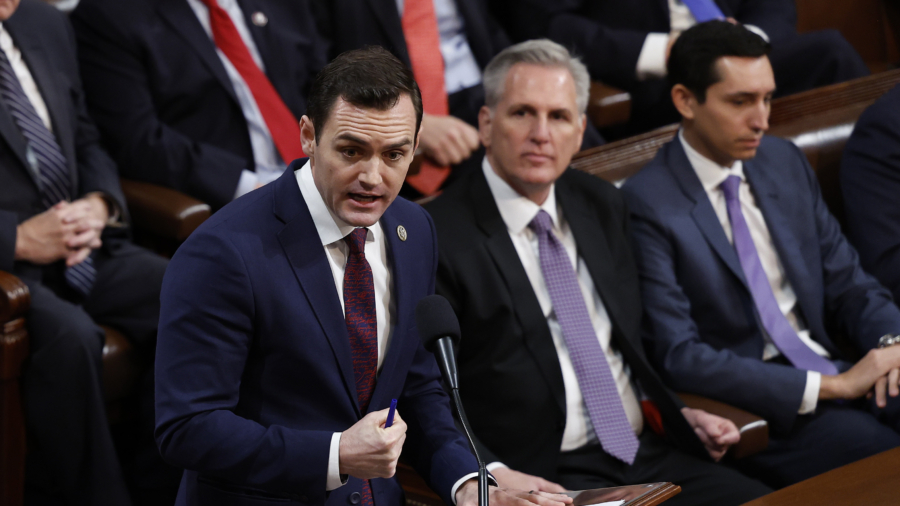Lawmakers are hoping the bipartisan support for creating the House Select Committee on the Strategic Competition between the United States and the Chinese Communist Party (CCP) will translate into solutions that a majority of Americans and the rest of the world will support.
Last month, the House voted 365–65 in favor of forming the new committee—one of the few issues that has won strong bipartisan support in the now Republican-controlled House. The 65 votes against the new committee came from Democrats.
Chairman Mike Gallagher (R-Wis.) recently told The Hill that he’s focused on maintaining bipartisanship, and finding where lawmakers from both parties can come together to strengthen the United States and counter the CCP.
“We’re going to try and identify what is the bipartisan center of gravity on China-related legislation and policy,” Gallagher said. “The numbers I have in my head are 70 and 70. What is the foundation of a coherent strategy vis-a-vis the Chinese Communist Party (CCP) that 70 percent of Americans can support and 70 percent of the world can support?”
Common Ground
Rep. Dusty Johnson (R-S.D.) told The Hill that Republican House Speaker Kevin McCarthy (R-Calif.) and Democrat House Minority Leader Hakeem Jeffries (D-N.Y.), both gave the committee a good chance of being effective by selecting lawmakers with records of bipartisanship from their respective parties to fill the new committee.
“This thing could have devolved into a clown show. But McCarthy and Jeffries, I think, gave us a really good shot of being effective,” Johnson said.
Gallagher praised McCarthy’s picks for the Republican side of the committee, saying the lawmakers have experience from a wide range of past committee assignments, personal backgrounds and unique expertise.
“The Select Committee on the CCP will require the best and the brightest our nation has to offer, and the team Speaker McCarthy has assembled fits the bill,” Gallagher said.
Rep. Raja Krishnamoorthi (D-Ill.), the ranking Democrat on the new committee, told The Hill that he believes the panel could come together on issues like advancing U.S. capabilities in areas of technological competition with China, like artificial intelligence, cyber capabilities and quantum computing. Krishnamoorthi said the committee could also focus on changes to the workforce and supply chains that will lead to less reliance on China.
Rep. Ro Khanna (D-Calif.), another member of the new committee, cautioned against the panel becoming entirely focused on opposing China rather than also finding opportunities for cooperation.
“It would be an unfortunate incident, if the committee adopts rhetoric that just assumes a Cold War, or is not focused on, how do we have constructive engagement?” Khanna told the Hill. “There has to be toughness on the economy, there has to be total deterrence on Taiwan, but there also has to be engagement on, how do we have peaceful coexistence and how do we work on issues like climate and public health?”
Political Challenges
The Republican Party formed a special House task force for China-related issues in 2020. Then-Minority Leader McCarthy had said the task force initially had support from Democrats, but they walked away from the initiative “without notice or reason” after months of bipartisan planning.
McCarthy called on the then-Democratic majority to participate in the Task Force.
“There was one moment in time they said yes, a few months ago they said no,” McCarthy said at the time. “I’d say there was no more important time now to join with us together to work as one nation, as we face these challenges. We cannot wait any longer. The stakes are too high to sit idly by.”
Rep. Jim McGovern (D-Mass.), who voted in favor of the new House committee last month, told Politico he supported forming the panel but had some reservations.
“I have lots of concerns about how [Republicans] demagogue the issue and promote conspiracy theories and xenophobia,” McGovern said.
Rep. Ayanna Pressley (D-Mass.), was among the 65 Democrats who voted against forming the new committee. In January, she told CNN she voted “no” because “it’s another sham effort here.”
“It’s really clear that this is just a committee that would further embolden anti-Asian rhetoric and hate and put lives at risk.”
Republicans have been critical of Democrat President Joe Biden’s handling of various China-related issues, such as the Chinese high-altitude balloon that flew across the U.S. earlier this month. Several Republicans have questioned Biden’s decision to wait until after the balloon had finished flying over the United States before shooting it down.
Khanna pointed to the unanimous House passage of a resolution condemning the CCP for the balloon incident as a sign of the potential for bipartisanship.
“I think that the vote just now is a good indication of how the two sides can come together on issues related to the CCP in a way that is bipartisan,” Khanna told The Hill.

